Best GitHub Alternatives In 2023 – Top 9
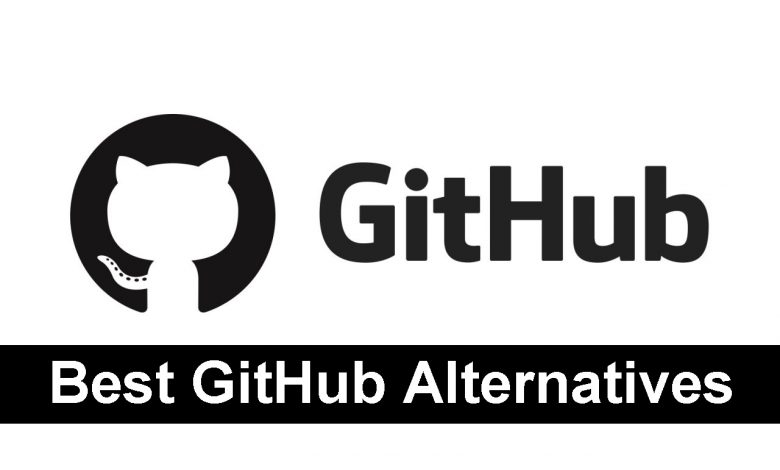
With technology improving and software development moving quickly, writers want the newest tools and ways to make software. With new tools and fast growth in the industry, businesses are more likely to grow.
In a time when speed and time are critical, these businesses need help keeping up with these new methods. Many polls have been done to determine how many workers use open-source tools.
What Is GitHub?
Github Dashboard
GitHub is a platform developers and programmers can use to share and postcode. It is free to use. Git is another type of Version Control, which is a part of software configuration management. It handles all kinds of files and saves different versions of projects.
It is a Microsoft company that offers Distributed Version Control (DVC) and Source Code Management (SCM) and adds its features.
GitHub Terminology
- Repository: Git is a place where every piece of code is kept. It is also called a storage or a repository.
- Fork: When you “fork,” copy the code from someone else’s source to your own.
- Upstream: The person or group who owns the code you copied.
Because of these three main features, GitHub is the best place for engineers to work and share their code with the rest of the community. Also, if you and a friend work on a project, Git lets you save your code on both computers. You can see the changes if you have written some code and a friend wants to change it. Git also lets you talk to other coders about problems with coding and other features.
Features of GitHub
- Code review goes smoothly because it is easy to suggest changes, ask to review, see what is different, leave notes, and get more precise feedback.
- You can see the big picture of your project by managing your work with cards and notes and tracking and assigning tasks.
- Integrations with top tools like Google, Codacy, Code Climate, etc., are more accessible for the right job.
- Find new tools and use teamwork and team management to make the most of GitHub and reach your full potential.
- Please put all your code in one place, confidently make changes, and share your code when it is ready.
List Of The Top GitHub Alternatives
#1) GitLab
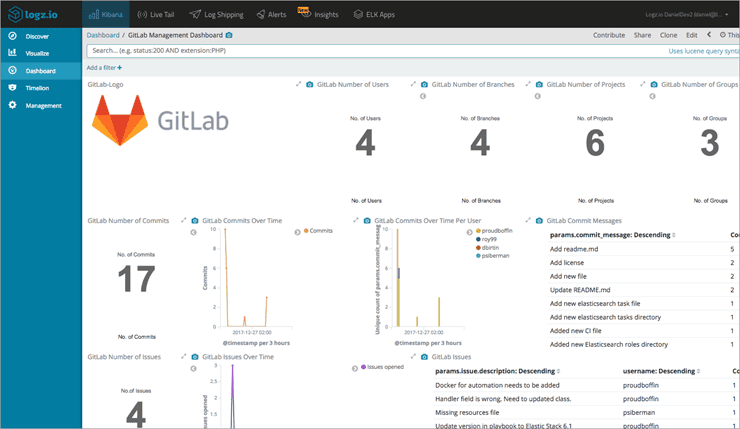
GitLab says that they are the only company with a single app for the whole DevOps lifecycle and that it is the only one that can do concurrent DevOps, making the process go 200% faster. The best thing about GitLab is that it covers the whole process, from planning a project and managing source code to continuous integration/continuous delivery, tracking, and security.
Integration of CI/CD saves both time and resources, which makes it easier for a coder to find problems early on and fix them. GitLab is used by more than 100,000 happy organizations around the world. It has a group of more than 2,200 contributors that is very active.
Features
- Authentication and Authorization with flexible rights, secure tags, and server access.
- There are various integrations, LDAP group sync filters, SAML SSO for groups, and LDAP support for multiple groups.
- Support for smart cards, control of the value stream, and IP whistling for authentication.
- With the advanced time tracking tool, you can keep track of your tasks’ descriptions, comments, and Drag-and-Drop moves.
- Management of the backlog, the risks, the portfolio, the team, the process, etc.
Pricing
Like GitHub, it has a free plan that developers can use for their basic needs.
Paid plans include:
- Bronze: For teams to speed up DevOps delivery ($4 per month per user).
- Silver: For IT’s to deploy advanced configurations ($19 per month per user).
- Gold: For large organizations to accelerate their business ($99 per month per user).
Official Website: GitLab
#2) Bitbucket
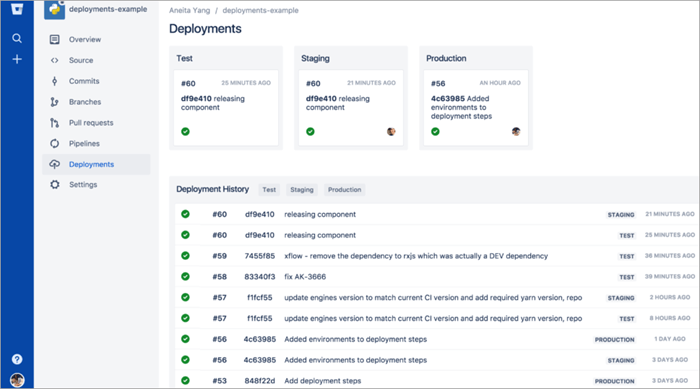
Bitbucket was made so skilled teams could plan projects, work together, test code, and carry out tasks in one place. It also gives small teams endless free private repositories and the best integration with Jira and Trello.
With the code review feature, Bitbucket helps you make better software faster. It is accessible to people and teams with no more than five users. On top of that, you can also add files using the Git command line.
Features
- Pull requests are a way to get better code and share it with your team.
- Branch permission lets you control who has access, and code-aware search saves you more time.
- Git LFS (ample File Storage) is a place to store big files and rich media.
- You can keep track of your projects and work together on them with Trello boards.
- Diff views, interaction with third-party apps, integration with build, and a desktop client.
- There are many ways to set up and run the system.
Pricing
Bitbucket has a free plan that lets up to 5 people have access to an unlimited number of private repositories.
Its paid plans include:
- Standard: For growing teams who need more ($2 per month per user).
- Premium: For large teams with advanced features ($5 per month per user).
Official Website: Bitbucket
#3) Launchpad
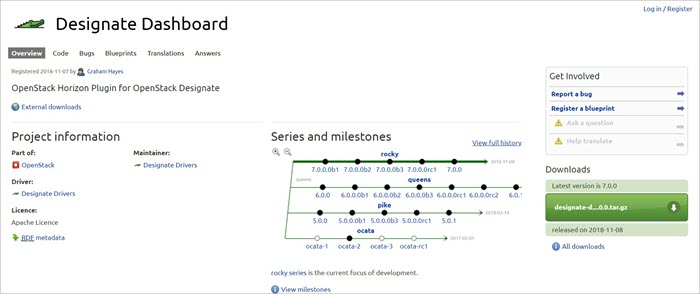
Launchpad started in January 2004 but had many problems because it wasn’t set up under a free license. This was fixed later, though. It was made and kept up by the company Canonical Ltd. It is an open-source site where software can be made and kept up-to-date for free by developers.
Launchpad works like this:
- Answers: For knowledge base and community support site.
- Blueprints: Specifications and features.
- Bugs: For tracking bugs and issues.
- Code: For hosting source code.
- Translations: For different human languages.
Features
- Bug tracking, storing code with Bazaar, code reviews, and translations into other languages.
- Ubuntu package, dashboard, and dashboard for open stack.
- A software tool for working together that is free and open source.
- Share bug reports, get email alerts, and comment on the fly.
- Make ties between bugs and branches, as well as between team branches.
Pricing
Launchpad is a web program for working on software together. It is a free, open-source platform for building and maintaining software.
Official Website: Launchpad
#4) SourceForge
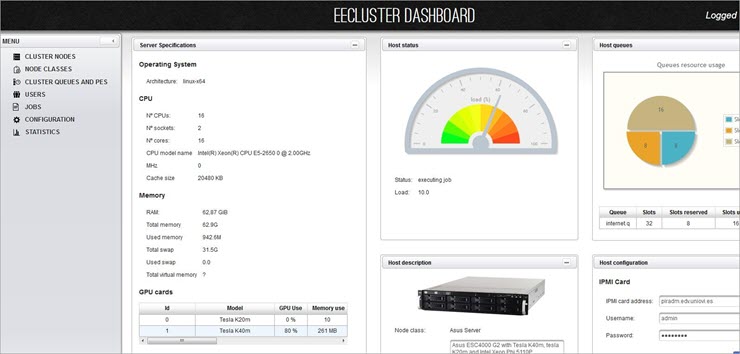
SourceForge is a place for software development that is free and open source. Developers make it for developers. Their main goal is to ensure that open-source projects do as well as possible. It is one of the most prominent places for IT workers to work on, share, download, and review open-source projects.
SourceForge lets you make things, work together on them, and share them with more than 30 million people worldwide. Slashdot Media, the best tech group in the world, owns the company.
Features
- You can use filters like area, platform, region, etc., to get analytics for your projects at any time.
- Works as a mirror network for open-source projects worldwide with endless bandwidth.
- You can put your projects into different categories, take screenshots, make movies, and share your work on social media with the Open Source Directory.
- You can share code with Git, Mercurial, or any subversion in an open-source repository.
- It runs on Apache Allura, which lets you run and improve your forge.
Pricing
- SourceForge is free and open source, so there are no costs.
Official Website: SourceForge
#5) Beanstalk
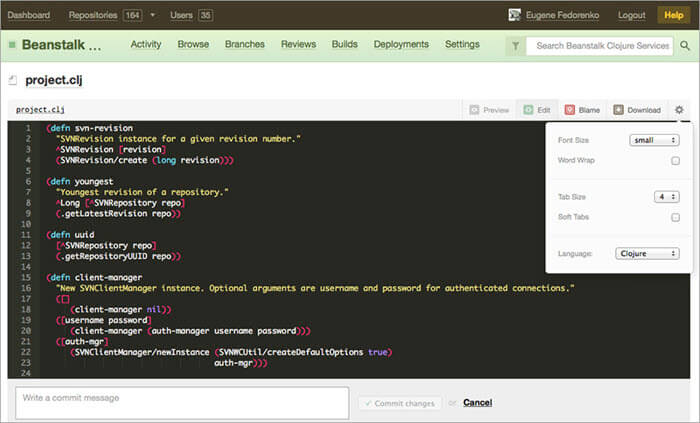
Beanstalk says they have everything you need to write, review, and publish code. Beanstalk doesn’t need a client. You only need to add files, make branches, and start making changes right in the browser.
It also has good storage for Git and SVN. It has intelligent code reviews that let it go with the flow. You don’t get stuck reviewing code because you can access all the information.
Beanstalk lets you keep track of your project’s problems and numbers. You can also launch your code from anywhere and in multiple environments.
Features
- Create and control repositories, invite team members and clients, and do all of this with the highest level of protection and reliability.
- You can review files and changes, update code, preview your work, compare it with other designs, and share it.
- Look back at the past of your file and compare the results.
- You can create, view, and merge your lines with just one click.
- Use different environments to run your code and keep your work uniform.
Pricing
Unlike other software, Beanstalk doesn’t offer any free plan.
It offers five different paid plans:
- Bronze: $15 monthly rate for independent workers and new businesses.
- Silver: Same as bronze but with extra features ($25 per month).
- Gold: For businesses and enterprises ($50 per month).
- Platinum: For businesses with extra functionalities ($100 per month).
- Diamond: For large-scale businesses ($200 per month).
Official Website: Beanstalk
#6) Apache Allura
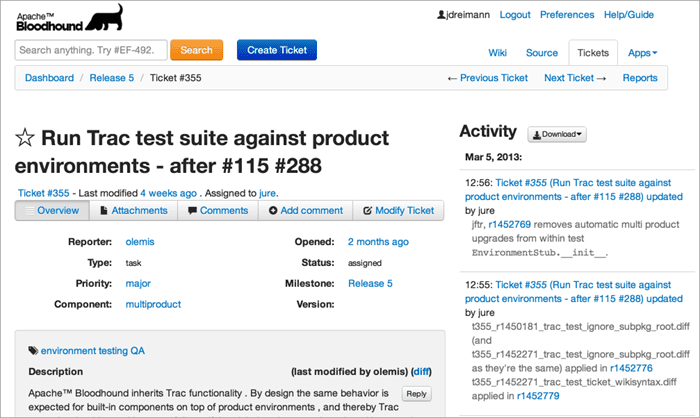
Apache Allura is open-source, free software that handles each report’s source code repositories, blogs, bug reports, documents, etc. SourceForge is another piece of open-source, free software that makers can use. It runs on Apache Allura.
Apache Allura is self-hosted on an instance of Git, Wiki, and tickets. The Apache Software Foundation made it. It has been written in five different ways so far: Apache Allura has versions 1.7.0, 1.8.0, 1.8.1, 1.9.0, and 1.10.0, which is the latest.
Features
- Advanced Search Syntax lets you work faster, and your most-used searches are saved so you can use them repeatedly.
- Using tickets, you can format and attach items. Ticket fields and marks can also be used to organize them.
- There are threaded chat rooms and a code store.
- Make wiki pages, add files, and have linked conversations.
- Take pictures of the project and mark the syntax for code snippets.
Pricing
- Apache Allura is entirely free and open-source.
Official Website: Apache Allura
#7) Git Kraken
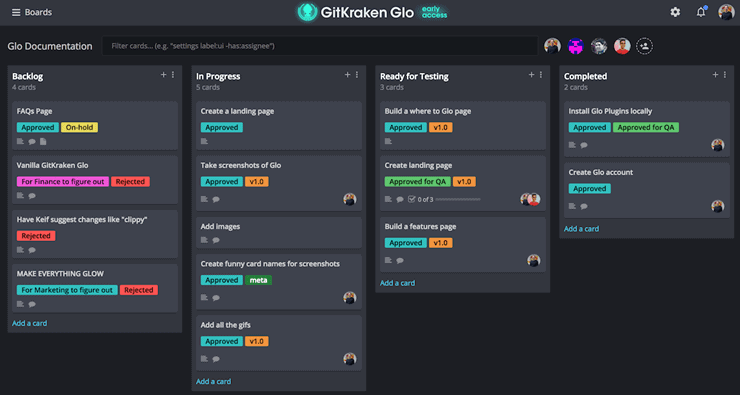
Git Kraken is a cross-platform Git client for Windows, Mac, and Linux. A company in Arizona makes it. Git Kraken is easy to use, looks good, and is reliable. It helps developers be more busy and efficient. Git Kraken is also free to use for non-business purposes.
It is straightforward to use, and its layout is easy to understand. It works well with other apps and is fun to set up with Git Kraken. That’s why people like to use Git Kraken so much.
Features
- Visual change history, drag-and-drop, fuzzy finder, and one-click undo and redo make the UI and UX easy to use.
- The merge conflict editor has an in-app join tool and an output editor.
- A built-in code editor has a split view, syntax coloring, searching within files, and a mini-map for each file.
- Git Kraken lets you keep track of tasks by linking a Glo board to a project. It also supports Markdown and has a calendar view.
- Other tools include support for Git flow, Git LFS, Git hooks, interactive rebase, light and dark themes, keyboard shortcuts, and so on.
Pricing
Git Kraken also offers a free plan for open-source projects.
It offers three different paid plans:
- Pro: For the team’s commercial use ($4.08 monthly).
- Self-Hosted Servers: For businesses with account management ($8.25 per month per user).
- Stand Alone (serverless): For enterprises ($8.25 per month per user).
Official Website: Git Kraken
#8) Gitea
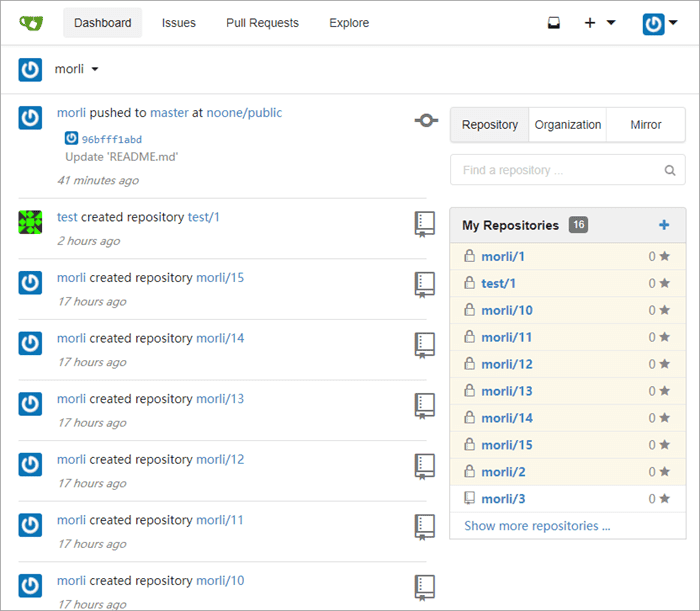
Gitea is a community that works on different systems, such as Windows, Mac OS, Linux, ARM, etc., and can be used anywhere. Also, a lightweight code-sharing solution written in Go has a community built and run. Gitea was put out under the MIT license.
Not only is running Gitea fun, but it also only needs a few things to run and can run anywhere. It is also an open-source tool, meaning anyone can come and help.
Features
- It is open source and works with various databases, operating systems, Markdown, and org-mode.
- RAM and CPU are used very little, and it’s easy to increase.
- There is support for CSV files and interaction with third parties. Git wikis, deploy tokens, and repository tokens.
- You can search for code globally, make new branches, change code on the web, and see a commit-graph.
- Pull-merge requests, squash merging, rebase merging, pull/merge templates, etc.
Pricing
The company hasn’t given any details about prices. It might be free to use since it is an open-source tool. Still, you can contact Gitea if you have any price questions.
Official Website: Gitea
#9) Git Bucket
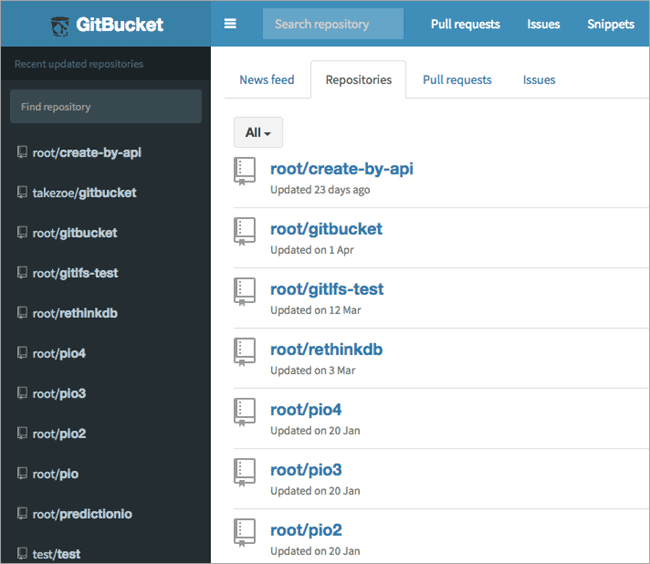
Git Bucket is a copy of GitHub that is easy to set up and is driven by Scala. It is a Git server that runs on JVM and is free to use. It is made to be a copy of GitHub for high extensibility, easy installation, and compatibility with the GitHub API in an open-source ecosystem that developers can use for free.
Also, Git Bucket is offered as an open-source project under version 2.0 of the Apache license. It also has similar features to GitHub, like storing Git repositories over HTTP and SSH, a user interface, issues, wikis, pull requests, etc.
Features
- It is self-hosted, free, open source, and works on multiple platforms.
- Easy to set up, SSH keys, and an excellent user interface like GitHub.
- There are both public and private Git repositories; you can read and edit files online.
- Searching the repository, getting emails about problems, and managing users.
- Wikis, fork-pull requests, an action timeline, LDAP integration, gravatars support, and so on.
Pricing
- Git Bucket is open-source, meaning anyone can use it for free.
Official Website: Git Bucket
Conclusion
The following comparisons relied solely on GitHub Alternatives to determine which tool was superior. The statistics above, reports, and data can be found online.
If we look at GitHub’s options, each has pros and cons. Gitea, Git Bucket, and Apache Allura are all free and open-source. Each has its tools to meet different needs.
GitLab, Git Kraken, and Bitbucket are other tools that are not open source but also have free plans. Their paid plans are advanced and suitable for skilled teams, businesses, and high-end developers.




